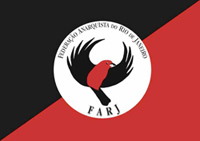by Tina Sizovuka
(Tokologo African Anarchist Collective)
 Nelson Mandela has become a brand, “Brand Mandela,” his image, name and prison number used to generate cash and to promote the legend of Mandela. In July 2012, for example, the 46664 clothing line was launched (all “Made in China”).
Nelson Mandela has become a brand, “Brand Mandela,” his image, name and prison number used to generate cash and to promote the legend of Mandela. In July 2012, for example, the 46664 clothing line was launched (all “Made in China”).
But “Brand Mandela” is more than just an opportunity to sell stupid trinkets to tourists and celebrities. It is also a dangerous myth, based on Mandela-worship, promoted daily in the public imagination to serve far more sinister interests.
The myth of Mandela is used to give the vicious South African ruling class credibility by association, and to legitimise the the ruling African National Congress (ANC). It is no surprise that the 2012 launch of the new “Randelas” – South Africa’s new set of banknotes, with Mandela on – coincided with the ANC’s national conference at Manguang. Read the rest of this page »






 Call for solidarity and endorsement against the persecution in Brazil of anarchist militants and the Federação Anarquista Gaúcha in Porto Alegre
Call for solidarity and endorsement against the persecution in Brazil of anarchist militants and the Federação Anarquista Gaúcha in Porto Alegre















